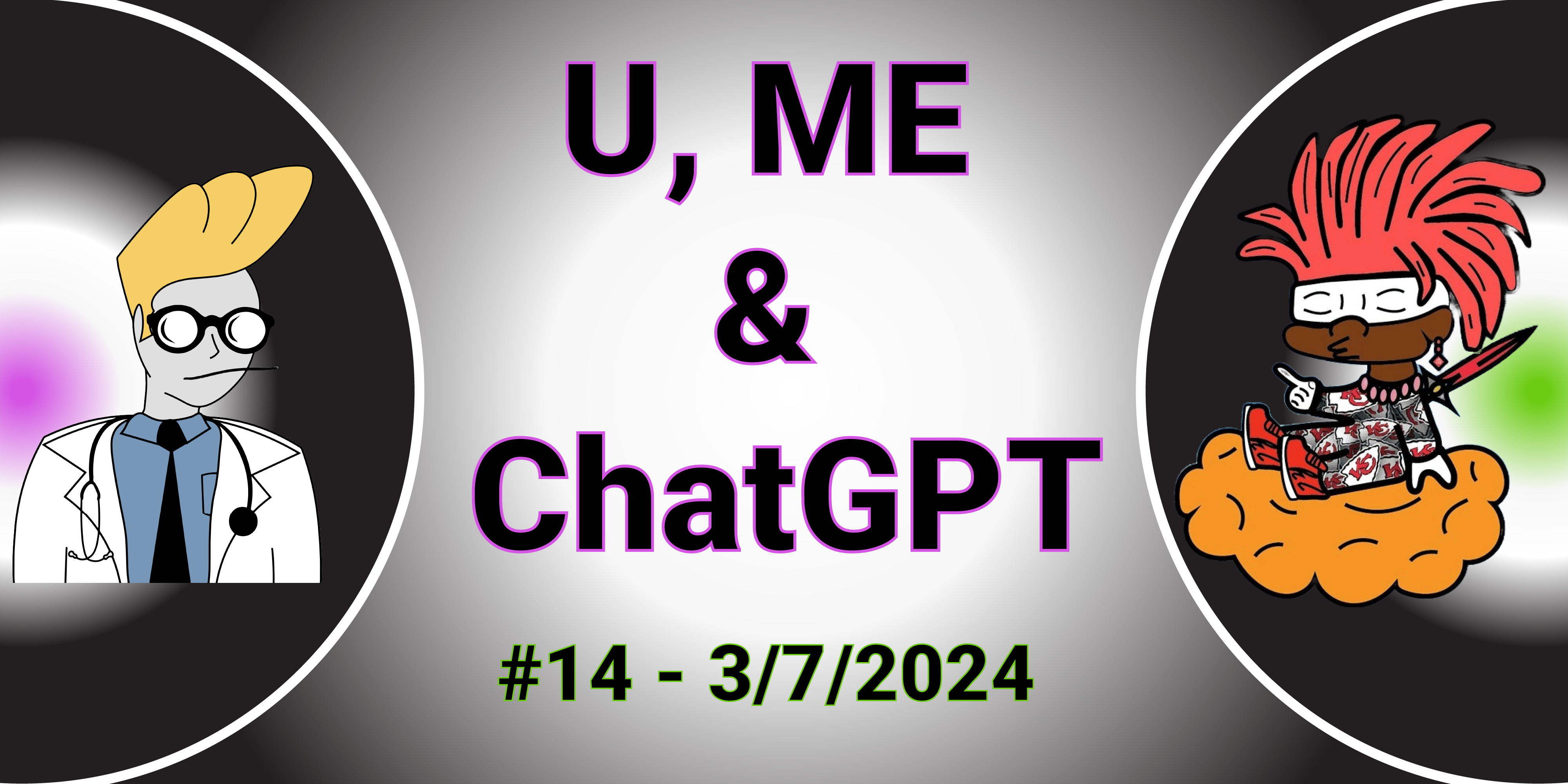The web3 headlines lately have been too heavy on hard forks, yield farming, and layer 2 solutions; too light on cartoon supervillains, stoner art, and psychodrama. Never fear. We are here to make everything important on the Internet interesting, too.
Chad & El Prof
Markets
(Price changes reflect past 7 days as of 3.22.22 @ 4:20 PM EST.)

Are you post money?

In turns out, the ‘Prince of Crypto’ sees many of the same problems with it as we do. Vitalik Buterin (Ethereum co-founder, and ETH miner, as pictured above) recently gave an extensive interview with TIME espousing his philosophy on crypto, authority, and the future of the Internet. And, well… if you wish cultr_h0r was slightly less laconic and slightly more coherent, go check it out.
Otherwise, here’s the TL;DR — Buterin loves the potential of the technology’s impact on financial accessibility, voting systems, and distribution of public goods. But he hates its adoption and execution by centralized for-profit industries, right wing anarcho capitalists, and anyone else who’s only in it to turn their million dollar furry fetish art into a fast food pop-up shop. Notably, he speaks with both mouth and money, eschewing any sort of formal power over the blockchains on which he exerts an outsized influence, even at the cost of his own financial interest.
Instead, he exercises a sort of ‘soft power’, articulating his egalitarian viewpoints and vision for the future of web3 in blogposts and conference appearances, while all actionable decisions are voted on by the community. And, look, we believe in changing the world through strongly-worded Twitter rants, too. So we appreciate the high profile proponent of our preferred form of power. (Wordcels don’t get enough respect.) But we’re less bullish on the assertion that this all somehow makes a 28-year-old billionaire ‘the first example of a guy who is pomo – post money‘.
It’s unclear exactly what the afore-linked tweet is referring to. Possibly, it refers to PMMT, or Post Modern Monetary Theory, described in this thread as ‘a system designed so that numbers mostly just go up and up and up, as they mean less and less and less. Thus, BTC. And oil, and nickel, and […] pretty much everything marked to market.’ Which would be an accurate description of a guy whose fortune arose from making arbitrary numbers go up and up, although he’d hardly be the first example. Probably, then, @novogratz‘s definition of post money is synonymous with an idea the TIME profile also implicitly endorses: Buterin’s bare minimum effort to practice what he preaches is somehow paradigm-shifting.
To be fair, the reason web3 has so quickly devolved from a utopian pipe dream into a dystopian clusterfuck is because there are fewer guys like Buterin in positions of influence. Large portions of many major token supplies are held by their founders, and, even if access is permissionless and public, private corporations dictate the direction these blockchains take. It’s easy to talk up transparent networks when you’re on your knees in front of Marc Andreessen with his pants around his ankles. But if equitable access to resources and decentralization of power were more than just marketing jargon, there wouldn’t be crypto billionaires tweeting about them. There wouldn’t be crypto billionaires at all. And the fact that Buterin is one, in my opinion, makes him aggressively not post money.
In web3 circles, the idea of somehow being ‘above’ money is very much in vogue. Sahil Bloom, Twitter’s premiere finance bro, recently tweeted, ‘Money ≠ Wealth. Time is the only true form of wealth. Too many people have a lot of money, but very little time.’ Which is indicative of shifting attitudes toward wealth among the incredibly wealthy. Status / clout / perceived personal freedom is now preferred over a simple screen grab of ten digits in a bank account. But, as my writing partner El Prof pointed out, Time = Money, as everyone knows. So, by Bloom’s own equation, Time ≠ Wealth.
However, Time + Money = Choice. And Choice = Wealth. Meaning, if you had the time to make money, or have enough money to buy yourself indefinite amounts of time, you have choices — like, say, the choice to burn your billions of dollars worth of SHIB just because you don’t want the responsibility. Doing so doesn’t make you post money, though, because you needed wealth to have the option in the first place. Buterin surely wouldn’t have thrown away $6B if he didn’t have another big B to fall back on. And valuing your values above having more money in your MetaMask than any one human being could dream of spending doesn’t make you a hero. It makes you a moderately unproblematic mediocre white man.
Honestly, I like Buterin. He wears pajama pants in public and he’s lankier than I am. I’m only ranting because I drank too much caffeine this morning, and because we need to stop elevating people to idol status for doing one decent thing. Post money paragons aren’t going to be 1%ers who write Georgist blogposts and don’t buy mega yachts. They’re going to be average people like us, willing to make real financial and lifestyle sacrifices, so others can access the same basic choices we were born with. Whether web3 is the platform where that change happens or not, every technological innovation runs the risk of becoming a handful of peoples’ meaningless numbers, going up and up, until we all become post money, whether wealthy or not.
Escapism at its loudest

I am a simple guy. Post money, you might even say. My driving motivator is not to be rich, nor even for my peers to perceive me as rich. Give me a hot beach, a good book, and some loud ass flower, and I’ll be content for the rest of my life. But, while I was sleeping on a couch a mile high two weeks back, it was our patron saint of funding, Madison Jesseka, kicked back on Venice Beach, lounging and bouging it up with her sister, sparking conversations up over greens with a local artist.
The surrealist paintings of Daniel Castro, or @dcastroarts, are very much my vibe. Castro, a native Brazilian, appears to be on the same metaphysical tip as our own brand, an idea referenced repetitively in his use of eyes and scenery, which seems to reflect the all-encompassing nature of our universe and the abstract ways in which everything is actually composed of the same core building blocks. In his own words, the work he’s been producing since 2010 consists of 7 major elements: “Modernity, Contemporaneity, Innocence, Simplicity, Spirituality, Happiness, and Poetry”. Sounds like exactly the type of guy who’d burn one down on Venice Beach with my fiancée. But. Like I said. My vibe.
Now, while I find the message of his art uplifting and fairly well executed from an elemental checklist standpoint, it’s pieces like this bloody windstorm gunning for my beloved palm trees, pictured above, that steal my heart. I’m not entirely sure what the floating targets in the sky symbolize, but the energy to me feels both ominous and serene. It invokes my own inescapable desire to escape to a better place — the digital dreamscapes of the Metaverse, the sweet release of some Bubba Kush, or the beach to read and listen to the waves crash upon its shores.
Peep Daniel’s website if you are looking to purchase prints, at a reasonably priced $30. It sure beats the gas fees — at the pump or on the OpenSeas.
Monkey on my back

Last Thursday, Yuga Labs’ $APE coin debuted. In hours, its value had fallen 80%. The next day, it had risen 90%. As I write, it rests at a comfortable mean. This volatility, absurdly, is average for an ICO; maybe even below, given the profile of the project behind it. The roller coaster of DeFi investing is made of rickety wood and equal parts nauseating and exciting, a ride to try to enjoy while knowing the tracks might crack at any moment. But degens are junkies for more than just adrenaline.
An entire fringe field of study — ‘tokenomics‘ — has emerged to try to predict these web3 market waves. What does the longevity of a new cryptocurrency rest on? Supply cap? ROI? Meme potential? All valid options in theory, but in practice, I got a C+ in Econ, so I have nothing intelligent to say on the statistical side of things. Besides, while cargo cult science is all well and good, the humanities major in me will always snub empirical facts, as long as anecdotal evidence exists. And, if my Twitter feed is anything to go off, cryptocurrency volatility doesn’t require a PhD to predict. Just some Psych 101.
Every morning, I wake up to countless tweets along the lines of ‘what NFT should I buy today?’ We’ve written before about Shill Twitter, but lately it seems like more than just the spectre of overnight financial gain driving these neurotic contributions to the collective conversation. The way in which most members of the web3 community engage with each other online smacks of compulsion. I am, in fact, cripplingly OCD, so I might actually know what I’m talking about. And, every time I scroll past another handle ending in .eth cheerfully tweeting ‘GM!’ out into the void, I just see a poor, sick soul, whispering consonants under his breath to make his mouth feel normal.
OCD consists of behavioral addictions — actions carried out compulsively to trick a chemically unbalanced mind into temporarily feeling calmer, safer, normal. FOMO, I’d argue, is the neurotypical version of the disorder. Fear of missing out is an obsessive, compulsive addiction. And, among the degens, it is an epidemic.
There’s no shortage of research — bio and anthropological — supporting our species’ reliance on in-grouping. The drive to be part of something is a powerful motivator, but not inherently addicting in and of itself. However, web3 has gamified ‘being part of something’. And games sure as hell can be obsessively addicting. Web3 communities, DAOs, gather on Discord, a gamer chatting app. Web3 status symbols, NFTs, have been repeatedly likened to digital trading cards. Web3’s currencies — fashioned after sci fi elements, virtual avatars, and memes — are glorified casino tokens. Web3’s greatest innovation to date? Quantified status transactions.
It’s telling to me that a massive influx in web3 interest and crypto scams coincided with the COVID pandemic. Stuck inside, we, on a whole, became extremely online. I’m embarrassed to admit that, at the time, I was optimistic about how this forced mental health break would effect the human condition. Without geotagged parties and drunk Snap stories, FOMO could’ve gone the way of the appendix. But, much like my overactive amygdala will sometimes interpret my ceiling panels as saber-toothed tiger eyes, human nature finds a way, regardless of the input. So, as soon as a vacuum of naturally occurring FOMO presented itself, an artificial one had to emerge to fill its place.
Which is why crypto is here now in such a major way, and, probably, here to stay. It is a version of games we always played with each other, optimized for our lizard brains; a gambling addiction for the Internet age, with the promise of riches and acceptance on the line, and without the requisite trip to the boardwalk. But, as with all casinos, the house always wins. Web3 Is Going Great describes how the ApeCoin shitshow underscores ‘the fantasy about a fairer distribution of wealth that some people thought crypto would somehow magically bring about’, summing it up with this quote from a Reddit thread:

Of course, the Ponzis won’t always be so blatant. (The coin’s called APE. Poor normie betas should’ve known their hard-earned bananas would be wrestled away by the silverbacks.) But the burgeoning field of tokenomics, while admirable in theory, will need to expand its scope if it is to truly help anyone. We suggest ditching the Econ textbook for a copy of Baboon Metaphysics. Or, at least, The Big Book.



